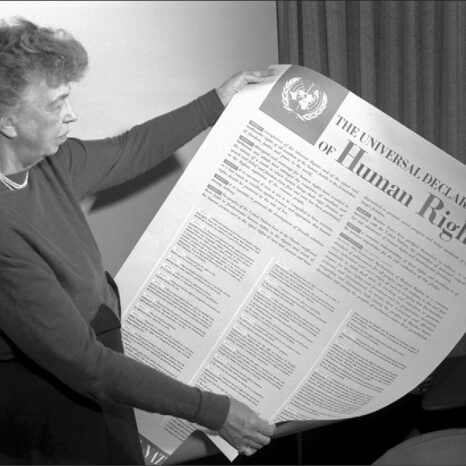Universal Declaration of Human Rights
After the Second World War and the atrocities that took place, governments around the world came together to foster peace. In June 1945 the United Nations was established. Under the guidance of Eleanor Roosevelt (First Lady of the United States 1933-1945) 30 Human Rights were compiled and entitled the Universal Declaration of Human Rights (UDHR). More than 75 years later, these same 30 Articles of Human Rights form the basis for all international human rights law.
Article 18 of the Universal Declaration of Human Rights states:
“Everyone has the freedom to think or believe what they want, including the right to religious belief. We have the right to change our beliefs or religion at any time, and the right to publicly or privately practise our chosen religion, alone or with others.”
Sadly, respect for article 18 and freedom of religion or belief isn’t so universal. Many countries, governments and social groups don’t feel that freedom of religion or belief is a human right and are actively committing FoRB violations.

Rights
Article 18 recognises that everyone has the right to freedom of thought, conscience, and religion. This includes the freedom to hold any belief or non-belief, whether it is religious, secular, or philosophical.

Freedom to Manifest Beliefs
Article 18 also protects the freedom to manifest one’s beliefs, either alone or with others, in public or in private. This includes the freedom to practice one’s religion, to observe religious holidays and ceremonies, and to share religious beliefs with others.

Protection for Society
Individuals are free to have or adopt a religion or belief of their choosing and should not be forced to adhere to a particular religion or belief system against their will and should be free to change their beliefs without fear of persecution or punishment.


FoRB
FoRB violations range from name calling to rape, torture and radicalisation. People are socially isolated or enslaved and incarcerated for peacefully practicing their faith or belief. This is a global phenomenon and can be experienced in first, second and third world countries. Look around you, where you live, where you work and what you see in the media and you can find examples of FoRB being both respected and violated.
Influences on FoRB
Law
International and Criminal Law work along-side FoRB to protect this Human Right. Holding governments, organisations, and social groups to account at an international level. Without law there is no Justice or accountability. If we do nothing, we save no one, if we do something we save someone.
Social Groups
Social Groups range from families, clubs, and teams to associations, governments, and nations. The values of social groups can greatly influence societal pressures and possible lack of respect towards article 18. Likewise, social groups can have a positive influence on matters relating to FoRB.

